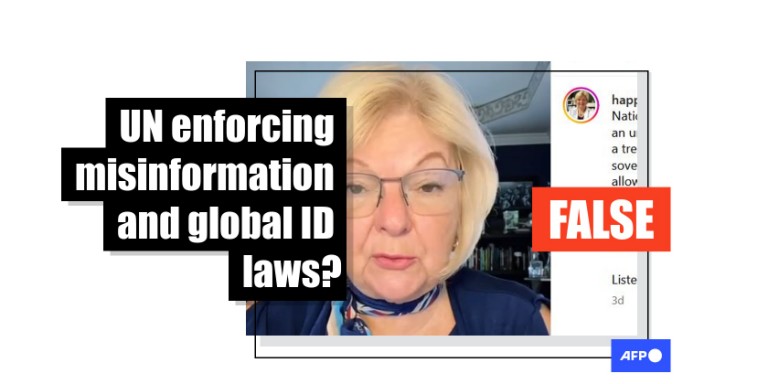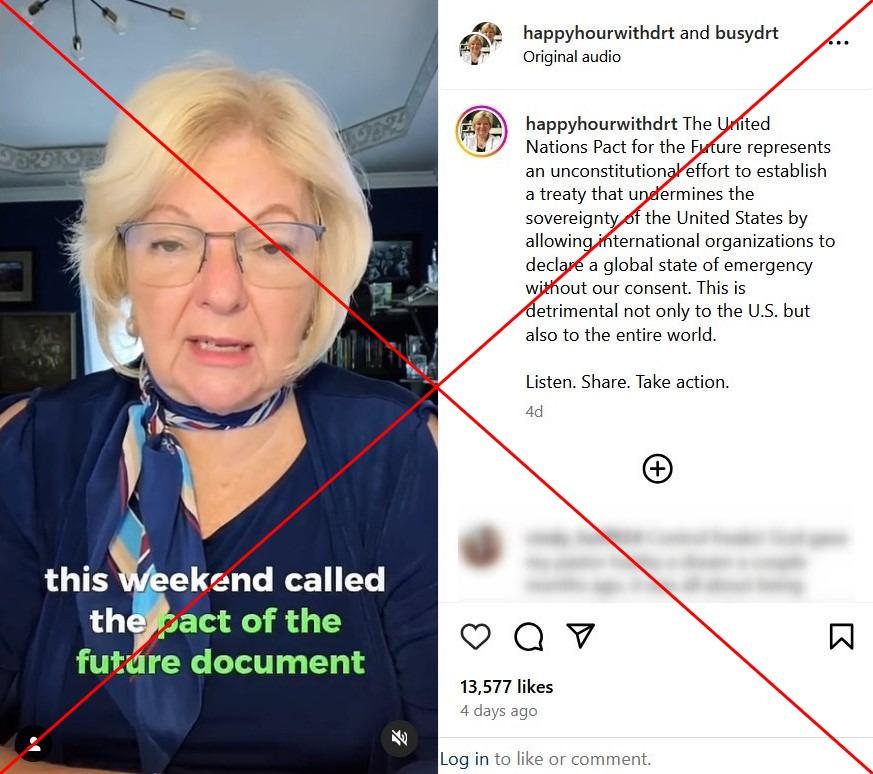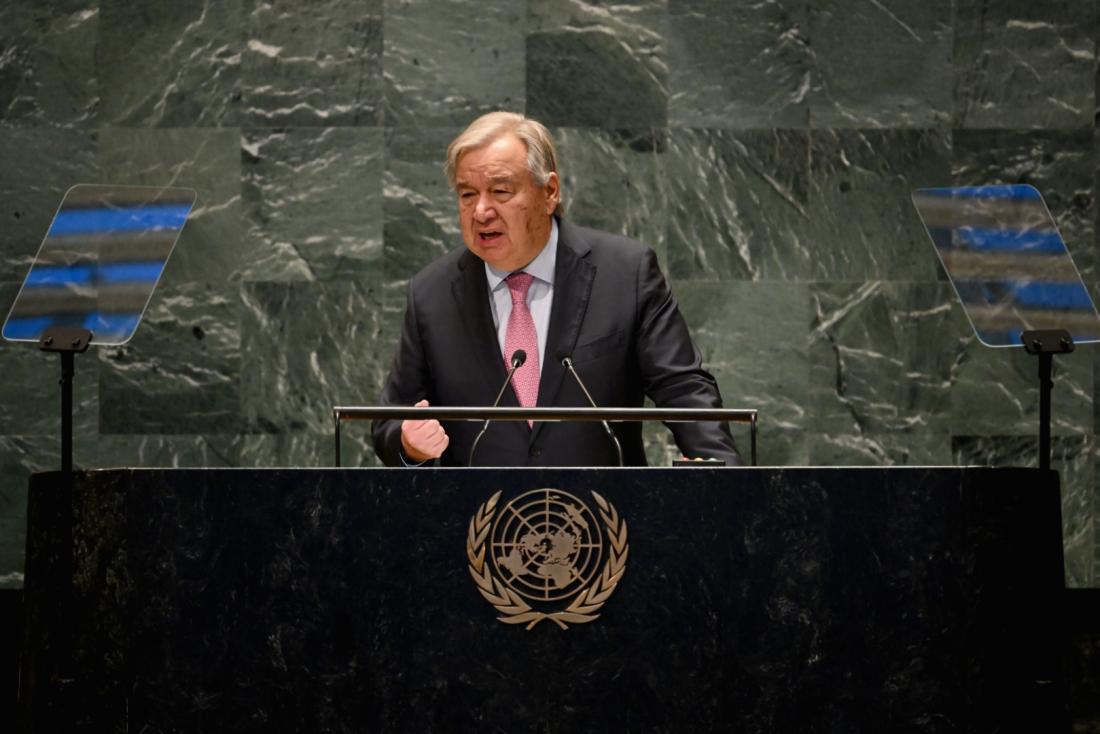
False claims about 'aspirational' UN pact spread online
- This article is more than one year old.
- Published on October 2, 2024 at 18:04
- 4 min read
- By Daniel Patrick GALGANO, AFP USA
"The United Nations Pact for the Future represents an unconstitutional effort to establish a treaty that undermines the sovereignty of the United States by allowing international organizations to declare a global state of emergency without our consent. This is detrimental not only to the U.S. but also to the entire world," says a September 24, 2024 Instagram post from Sherri Tenpenny, an anti-vaccine activist whom AFP has previously fact-checked.
Tenpenny -- an Ohio osteopath with a history of profiting from misinformation -- claims in an accompanying video that the Pact for the Future will empower the United Nations to impose new laws on member states.
She also says the declaration allows the UN to punish those who spread misinformation by restricting their bank accounts and preventing them from traveling on public roads or transportation.
"Nothing can be more important at this point in time than to get prepared," Tenpenny says in the clip. "Have water, food, digital access, flashlights, a way to communicate with family and friends."

The same claims have circulated elsewhere on Instagram, Facebook, Threads, X, TikTok, Reddit, Rumble and Gettr -- including in Spanish, Japanese and Arabic. A group of US lawmakers and activists also amplified them during a September 17 press conference at the US Capitol in Washington (archived here).
The UN General Assembly adopted the pact September 22 after the Summit for the Future, a meeting Secretary-General Antonio Guterres first proposed in 2021 and scheduled to coincide with a week of high-level diplomatic activity. Guterres hoped the summit would produce an agreement to rekindle international cooperation and address ongoing global challenges.
The pact's passage was briefly delayed after a group of countries led by Russia attempted to introduce an amendment emphasizing the "principle of non-interference in the internal affairs of states," but it was overwhelmingly dismissed and the resolution passed without objection.
Some critics say it lacks incentives and new ideas to address international conflicts, while others -- including former US presidential candidate Robert F Kennedy Jr and Argentine President Javier Milei -- claim it violates UN member states' sovereignty.
While the Pact for the Future does offer recommendations for addressing issues such as vaccine administration, it does not give the UN the power to impose specific policies.
The text "is not the sort of revolutionary document reforming the whole of multilateralism that Antonio Guterres had originally called for," Richard Gowan of the International Crisis Group told AFP.
'Respecting each other's sovereignty'
The final UN General Assembly resolution adopting the Pact for the Future does not include any of the language Tenpenny claims it does -- and the text urges member states to respect "each other's sovereignty and territorial integrity, upholding the principles of political independence and self-determination" (archived here).
Nowhere in the document is there a provision for the UN to declare a global "state of emergency," nor is there mention of worldwide biometric identification. The pact's two annexes, which address digital technology, also do not address such a scheme (archived here and here).
The document recommends states limit the spread of misinformation, especially in cases where it might fuel violence. However, the pact does not mention any specific criminal measures and asks states to respect the "right to freedom of expression and to privacy."

Tenpenny and Kennedy have attempted to link the Pact for the Future to a previous World Health Organization (WHO) proposal to address future pandemics, which some online have falsely claimed would give the body control over US health laws.
The 61-page Pact for the Future mentioned vaccines twice, encouraging member states to develop plans to better distribute vaccines and ensure they are available to children. No section allows the UN or WHO to declare an emergency and force inoculation.
'Toothless document'
Paul Stares and Natalie Caloca, the director and program coordinator of the Council on Foreign Relations Center for Preventative Action (archived here and here), said General Assembly pacts are not laws and that the body cannot impose penalties for spreading misinformation or refusing vaccination.
"They are an effort to shape global norms and urge international action," the pair said in a September 27 email. "The provisions of the Pact for the Future will not be legally binding or enforceable in the United States or elsewhere."
Stares and Caloca said it is "unlikely, if not impossible" that the UN Security Council (UNSC) -- which can issue binding resolutions -- would consider adopting the Pact for the Future because of Russia's last-minute objections and the vague wording of its 56 "actions."
"In other words, the pact's proposals are largely too ill-defined to be enforceable even if the document were to be adapted into a UNSC resolution and passed," they said.
Karen Mathiasen, program director at the Center for Global Development (archived here), said the declaration is "toothless."
"There's no enforcement, there's no accountability, there's no accountability mechanism, no real follow up, no implementation plan," she said September 27.
"For the most part, it's really sort of a feel-good document, and I think to release the sort of feel-good document at the moment of crisis is not necessarily too constructive."
Copyright © AFP 2017-2026. Any commercial use of this content requires a subscription. Click here to find out more.
Is there content that you would like AFP to fact-check? Get in touch.
Contact us
